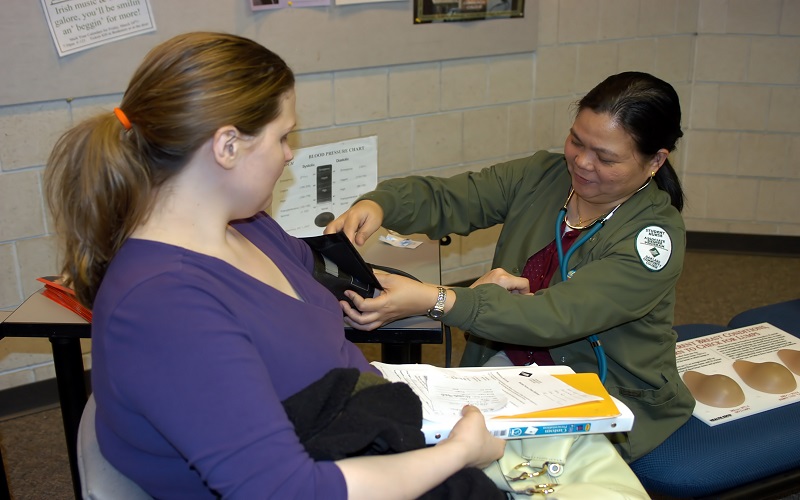Leave the Sweaty Sock, Onion and Bacon Plaster to the History Books
Your great, great grandma may suggest wrapping half an onion around your neck with a sweaty sock, or covering your chest with raw bacon and gauze to help ward off colds and flu, but Mary Miles, OCC dean of health professions, offers a set of more practical and proven suggestions to keep high school and college students healthy this winter.

“The CDC reports an estimated 6.4 million flu illnesses already this season. Influenza and related activity is high, and continues to increase, especially for high school and college students who are extremely busy and may not take care of themselves the way they should,” said Miles. “More than the discomfort of a stuffy nose, scratchy throat or disrupted digestive system, winter illness impacts students’ academic schedules, social activities and work attendance.” According to the CDC, absenteeism due to illness, injury, or a medical problem or appointment spikes December through March, coinciding with peak cold and flu season.
Miles notes flu symptoms can include fever or feeling feverish, chills, cough, sore throat, runny or stuffy nose, muscle or body aches, headaches and fatigue. The flu can result in serious health problems for adolescents, seniors and anyone with a compromised immune system.
“Cold symptoms are usually milder than flu symptoms, but can still sideline you with a runny or stuffy nose,” said Miles.
Miles suggests the following seven tips to maximize winter wellness:
1. A-B-C Your Hand Washing. The most effective way to remove and prevent the spread of illness-causing germs is to wash your hands scrupulously and frequently. Use warm water and work up a robust lather of soap, rub and scrub as you sing the A-B-C song, or for at least 20 seconds. If you’re out and don’t have access to a sink, avoid touching your eyes, nose and mouth -- especially important at the gym or after touching communal surfaces – until you can wash your hands.
2. Get a Shot. It’s not too late to get a flu vaccination, always the best way to prevent flu and its potentially serious complications. According to the CDC, greater than 99 percent of the influenza viruses tested this season are susceptible to the four FDA-approved influenza antiviral medications recommended for use in the U.S.
3. Pack Your Plate. Serve up healthy portions of foods known to buttress the immune system, including a variety of dark leafy greens, broccoli, blueberries, citrus fruits, fresh ginger, sweet potatoes, mushrooms, garlic, and turmeric. Also, consider supplementing your diet with a probiotic featuring a prebiotic.
4. Move. Then Move Some More. Snow, wind chill and winter doldrums may sap your will to sustain a workout routine. If you just can’t muster the oomph to get to the gym, try this home-based, no-equipment workout. Complete 20 seconds of each of the following movements, with 10 seconds of rest between movements: Jumping Jacks, Squats (use a chair to guide for depth … just don’t sit!), Push Ups (modify by using your knees or the wall) and Sit Ups or Planks. If you’re not currently working out, start out with one round (or two minutes) and work your way up to 15 rounds (or 30 minutes).
5. Just Chill. Life comes at you fast. Make sure to schedule time to just be, whether that’s taking time to meditate, read, connect with friends, or sit quietly for a few minutes to regroup and calm your mind.
6. Hit the Rack. How much sleep people need to restore and revitalize their body, and feel rested in the morning may be unique, but there are universal tips to maximize slumber. Those tips include: put down electronic devices or stop TV watching at least two hours before bed, avoid caffeine after 3 p.m., establish a consistent wake / sleep routine, avoid alcohol consumption, sleep in a cool room, reduce your fluid intake a few hours before bed, exercise for at least 30 minutes every day, and invest in a good pillow.
7. Seek the Sun. Sunlight helps boost the release of a hormone called serotonin, which regulates mood, appetite, digestion, sleep, memory, and more. Exposure to sunlight is especially important to those affected by seasonal affective disorder (SAD). Get outside for a walk, park yourself in a sunny window, or consider purchasing a light therapy lamp which many people find beneficial during the sunless Midwestern winters.
“The flu hits up to 20 percent of people in the U.S. annually, and students are particularly susceptible, but you don’t have to become a statistic,” said Miles. “Follow a healthy diet and proper hygiene practices, get plenty of sleep, exercise, and sunshine, and minimize stress to help keep your immune system in top form.”
Oakland Community College’s Health Sciences programs offer students state-of-the-art facilities, highly skilled professional faculty members, and a wide range of cutting-edge training in some of the fastest growing fields within the health industry. Programs offer an integrated approach to learning that allows students to improve their marketable skills as a healthcare professional in the following fields Dental Hygiene, Diagnostic Medical Sonography, Health Care Administration, Medical Assisting, Nursing, Occupational Therapy Assistant, Physical Therapy Assistant, Radiologic Technology, Respiratory Therapy, Surgical Technology, and Veterinary Technician. For more information about the Health Sciences Program, visit https://www.oaklandcc.edu/health/
About OCC
With multi campus system in Oakland County, OCC is Michigan’s No. 1 transfer institution, offering nearly 100 degrees and certificates. The College empowers academic and developmental experiences, allowing students to reach their potential and enhance their communities. More than 1 million students have enrolled in the college since it opened in 1965. A seven-person Board of Trustees governs OCC. Board members are elected on a non-partisan, at-large basis, serve as volunteers and are not paid. Mission statement: OCC is committed to empowering our students to succeed and advancing our community. Learn more at oaklandcc.edu.
###
Media Contact: OCC Marketing & Communications | (248) 341-2020 | contactus@oaklandcc.edu